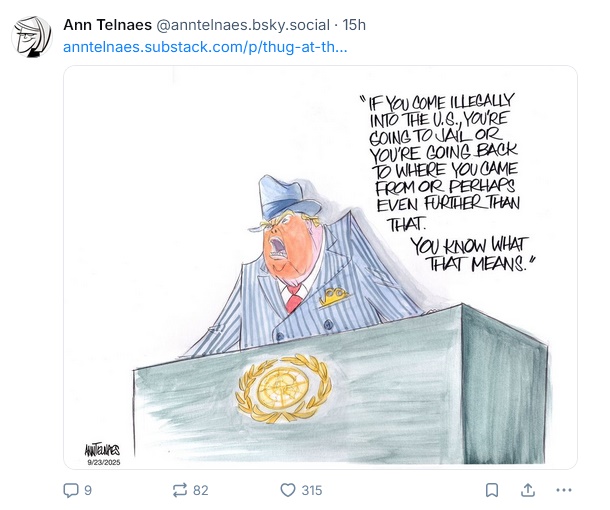

* Blog & notes for last week.
DAYLOG MON 22 SEP 25 / DRONE SHIELD: As discussed in an article from EURONEWS ("Europe wants to build a drone wall to protect its eastern flank from Russia. Is it feasible?" by Anna Desmarais, September 09 2025), the Russians have been performing drone and other air incursions into its neighbors to the west, much to their alarm.

Fortunately, a "Baltic Drone Wall (BDW)" is already being constructed as a cooperative effort between Poland, Finland, Estonia, Latvia, and Lithuania. At least eight companies are working on the BDW, with two of them saying parts of it have been deployed, but questions of how to integrate the BDW into European defense still remain unanswered.
The core of the BDW is a "multilayered drone defense system" named "Eirshield" -- an anti-drone platform developed through a partnership DefSecIntel of Estonia and Latvian company Origin Robotics. Eirshield uses an array of radars, imagers, and radio signals intelligence to determine a drone's flight path and its threat level. Using artificial intelligence, the system then determines whether the drone should be jammed or hit with an interceptor drone.
The system is highly automated, and can use a number of different interceptor drones from multiple manufacturers. It is in service in Ukraine, using a gun system to shoot down low-flying drones. Cost per intercept is "tens of thousands" of Euros ... as opposed to millions of Euros for traditional air defense systems. It's only capable of taking down drones and doesn't replace traditional air-defense systems.
So far, the European Commission is interested but noncommital about the BDW. Integrating the BDW into European defense systems promises to be a challenge, and other European nations have their own distinct requirements. However, drone defense is a big issue, and things are going to happen.
* Regarding the big jet-powered Ukrainian Fire Point FP-5 cruise missile ... the cheap Fire Point "FP-1" drone is already a mainstay of Ukrainian deep strike. Sources also mention the new Fire Point "FP-2" -- which turns out to be almost identical in appearance to the FP-1.

Both are pusher-prop twin-boom drones with fixed landing gear and inverted vee tail. The FP-1 has a range of 1,600 kilometers (1,000 miles); the FP-2 has a range of 200 kilometers (125 miles), but has a warhead almost twice as big. BTW, there is no "FP-3" or "FP-4".
DAYLOG TUE 23 SEP 25 / OLIGARCHS' REGRET: Everyone is aware of how America's business oligarchy backed Trump in the 2024 election -- only to find themselves being shaken down by Trump while he spreads economic chaos. There have been suggestions that the oligarchs don't mind so much, that the financial benefits of backing Trump are far greater than the skim they pay to him. Timothy Noah, a staff writer for THE NEW REPUBLIC, says they are instead having deep regrets.

According to an essay by Noah ("The Agony of Trump's Oligarchs, 23 September 2025), the nation's CEOs and political leaders are periodically invited to Washington DC by the Yale School of Management, the meetings facilitated by Yale's Jerry Sonnenfield. He and colleagues report in an article that the CEOs are unhappy, originally expecting relief through tax and regulation cuts, with Noah writing: "But things didn't go according to plan. Instead of taxes and regulations they got a rickety, ad hoc, and highly personalized form of government control."
Noah adds that while the CEOs protest Trump's undemocratic style, what they really resent having to "pay Trump tribute, either by enriching him personally or by helping him try to plug the $3 trillion revenue hole he created with" his tax cuts. "This is government by shakedown, and they are the mark. Couldn't happen to a nicer bunch." Over 2/3rds of the CEOs say Trump's tariffs, which they recognize as illegal, are hurting, and don't like Trump's attempts to take control of the Federal Reserve.
The CEOs particularly don't like what they call "quasi-socialist statism" -- not recognizing that what Trump is doing isn't socialism, it's a notably bullying form of traditional fascist crony capitalism: "... seizing ownership from private shareholders, dictating staffing, and selectively blocking moves into strategic markets based upon politics and kickbacks." Crony capitalism is collusive "give & take"; Trump emphasizes the "take".
Under Trump, the US government is grabbing stakes in leading-edge industries and getting cuts out of their sales. Add to that raising the price for H1-B visas to $100,000 USD; cutting funds for Biden's green energy development push; using foreign deals to sell Trump cryptocoin and making billions for himself. The money being raked in by Trump from corruption is said to dwarf the famous Teapot Dome scandal of the 1920s, even when corrected for inflation.
Noah points out that the business community, and the economy in general, prize predictability above all, and nothing is stable or predictable with Trump. How could they have thought that electing a nasty, inept, ignorant, bigoted, demented criminal was a good idea? Noah wonders how long it will take the CEOs to realize how foolish they were to "ever put their guy in the White House."
DAYLOG WED 24 SEP 25 / TRUMP AT UN: Yesterday, Donald Trump spoke at the United Nations in New York City. Seven years ago, the UN laughed at him. He didn't seem so comical now. One big theme of the address was illegal immigration: "Illegal aliens are pouring into Europe ... You have to end it now -- I can tell you. I'm really good at this stuff. Your countries are going to hell."

He said Europe needed to get tougher with Russia, and blew off climate change, saying: "It's the greatest con job ever perpetrated on the world, in my opinion. If you don't get away from this green scam, your country is going to fail, and I'm really good at predicting things."
Other items in the address included criticisms of countries recognizing a Palestinian state; justifications for bombing Iran and Trump's phony war on Venezuela; claiming that he was a champion of free speech; that he deserved the Nobel Peace Prize -- and other whopper lies: "We are rapidly reversing the economic calamity we inherited from the previous administration ... under my leadership energy costs are down, gasoline prices are down, grocery prices are down, mortgage rates are down ..."
Trump's UN address also featured petulant complaints about being stuck on an escalator there -- it turned out one of his people hit the STOP button in error -- and teleprompter problems -- his people were running the teleprompter.
Nobody laughed at the address because it was too appalling. A reporter commented that a career diplomat texted him with the punchline for the speech: "This man is stark, raving mad. Do Americans not see how embarrassing this is?" Yes, we do, but we're stuck with it for a few years.
* ZELENSKYY BREAKTHROUGH? Volodymyr Zelenskyy also addressed the UN, and had talks with Trump as well -- with Zelenskyy giving a highly optimistic read on how agreeable Trump was. It would be hard to read much into that, but Trump himself then declared that "Russia is a paper tiger", and that Ukraine can win back all the territory Putin took. On a video with Zelenskyy and Trump, Trump was asked if NATO should shoot down intruding Russian fighters, with Trump replying: "Yes, I do." Zelenskyy did a visible double-take.
Does it amount to anything? Dictators can manipulate Trump easily; it seems Zelenskyy is figuring out how to do it as well. Trump is blustery, but weak-willed and dim-witted -- while Zelenskyy is the reverse, straight talk while being strong-willed and smart. Of course, Trump goes along with the last person who talked to him, so Zelenskyy has to make sure he talks to Trump much more often than Putin does. As far as the people around Trump go, if Trump says he's all-in for Ukraine -- they will be, too.
DAYLOG THU 25 SEP 25 / MRNA VACCINES NOT DEAD: HHS Secretary Robert F. Kennedy JR has become notorious for his hostility to modern medicine, prominently halting research on mRNA vaccines -- which are seen by the knowledgeable as a major innovation, at the leading edge of medical research. As discussed in an article from NATURE ("RFK Jr cancelled mRNA research -- but the US military is still funding it" by Elie Dolgin, 24 September 2025), thanks to the Pentagon, mRNA vaccine research is not completely dead in the USA.

For example, work persists on a vaccine against the virus that causes "Crimean-Congo haemorrhagic fever (CCHF)" -- a disease spread by ticks that kills up to 40% of its victims. The military wants a vaccine not just to protect the troops, but because CCHF could end up causing a brutal and destabilizing global outbreak.
Amesh Adalja, an infectious-disease specialist at the Johns Hopkins Center for Health Security in Baltimore, is relieved that the military is backing mRNA vaccine research. Adalja is not at all saying everything's OK: "The whole biodefense structure is completely derailed. I've never seen it be disconnected like this."
Peter Berglund, chief science officer at HDT Bio in Seattle, was told in early August by HHS's "Biomedical Advanced Research & Development Authority (BARDA)" to cease research on the advanced mRNA vaccine that HDT was developing. The company was just starting human trials, and the directive was a "gut punch", as Berglund put it. However, he adds "that was mommy -- then daddy calls."
He got pledges of near-term support from the Pentagon's "Joint Program Executive Office (JPEO) for Chemical, Biological, Radiological & Nuclear Defense", which had been backing CCHF vaccine research in collaboration with BARDA. The project can proceed for now. The US Department of Agriculture is also funding some mRNA vaccine research, and Congressional Democrats are trying to restore BARDA funding in a showdown over a government shutdown.
Otherwise, the scene remains dismal. An HHS spokesperson blandly denied there was any problem, saying that "BARDA is prioritizing evidence-based, ethically grounded solutions" -- of course, as per RFK-JR's bizarre notions of "evidence" and "ethics". We're struck with the ruination; we can only hope to have enough left to rebuild when sanity prevails once again.
DAYLOG FRI 26 SEP 25 / NORD STREAM MYSTERY: As discussed in an article from KYIV INDEPEDENT ("Who sabotaged Nord Stream?" by Asami Terajima, 26 September 2025), on 26 September 2022, three of the four Nord Stream gas pipelines -- running through the Baltic Sea from Russia to Europe -- were sabotaged. Three years on, nobody knows who did it or why. Denmark and Sweden dropped investigations into the event with little comment in 2024. German investigation quietly continues.
The original twin "Nord Stream 1" pipelines were fully operational in 2012. The additional twin "Nord Stream 2" pipelines were completed in 2021, but never became operational. Neither set of pipelines were operational at the time of the blast, though they contained gas. Apparently, the reason the Nord Stream had fallen into disuse was because of the souring of Russo-German relations. At one time, the Germans actively cultivated a close connection with Russia, but gradually realized that Vladimir Putin was an enemy and could not be trusted.
The only story that emerged on "whodunit" was suspicion of a yacht with a Ukrainian crew, one "Serhii K" having been arrested in Italy. Another suspect, "Volodymr Z", fled Poland ahead of an arrest warrant. The Germans don't believe that implicates Ukraine, because Ukraine has plenty of criminals who could be easily hired to commit crimes, and who may not care or even know where the money they're getting came from.
More significantly, nobody could think of why Ukraine would have wanted to sabotage the pipelines. It could have no result except to antagonize Ukraine's allies. The fact that the pipelines weren't in use, and had no prospect of being in use, made them an inconsequential target.
The US government, which long opposed the Nord Stream project, pointed the finger at the Russians instead. Russian Foreign Minister Sergei Lavrov shot back to accuse the USA of the attack. Lavrov, of course, tells flagrant lies with a straight face all the time, so the denial means nothing.
Russia remains the prime suspect. It is not entirely clear why Putin would have bothered to blow up the pipelines either, but it is consistent with Russian behavior to make trouble for no visible reason. They are known to have sabotaged their own pipeline to Armenia and Georgia in 2006.
The Germans have arrest warrants out for other suspects in the attack -- but do not seem to be keen on making much of the issue, since it buys them nothing useful. Who sabotaged the Nord Stream? We may never know.